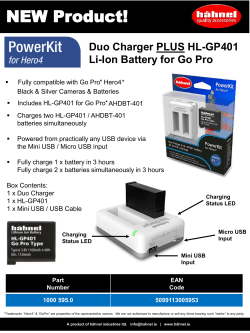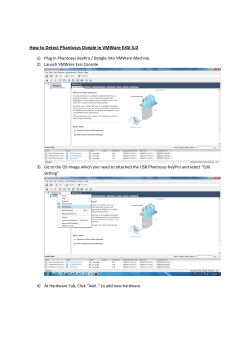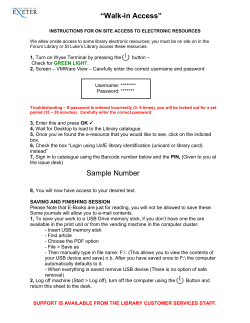
PDF-slides - Petri Paavola
TechNet TV Windows 8.1 BYODiin liittyvät ominaisuudet Petri Paavola Windows Client MVP Names.fi 22.10.2013 Petri Paavola Windows Client MVP Petri.Paavola@names.fi Windows 8.1 BYOD-käytössä Web Application Proxy Workplace Join Multi-factor Authentication Work Folders Mobile Device Management Open MDM RDS- & VDI-parannukset Windows To Go Publish web-based applications through reverse proxy AD FS based Single Sign-On (SSO) Multifactor authentication Multifactor access control Web Application Proxy Windows 8.1: Workplace Join Manage access to company data Register personal devices Simple for the employee Device enrollment with ADFS Workplace join • Käyttäjän oman laitteen ”kytkentä” toimialueeseen ilman että laite tulee toimialueen hallintaan • Standalone ja Domain Joined välimaastossa • Tarjoaa tietoturvaa ja helpon pääsyn valittuihin toimialueen www-pohjaisiin palveluihin SingleSignOnin kautta • Käyttää ADFS:ää • Clientit: Windows 8.1 ja iOS tällä hetkellä • AD:hen luodaan koneelle oma koneobjekti (RegisteredDevices) • Samassa yhteydessä luodaan laitekohtainen varmenne, minkä avulla käyttäjä/laite tunnistetaan myöhemmin Workplace join • Laitteelle voidaan antaa pääsyjä organisaation sisäisiin resursseihin • Koska laite tunnistetaan, voidaan luoda second factor authentication (lisää tästä myöhemmin) ja myös Single-SignOn saadaan käyttöön • esim. vaaditaan, että external-yhteydenotot täytyy tehdä varmenteilla (tunnettu kone Workplace Joinattu) sekä lisäksi vielä tietty AD-ryhmä (Multifactor Access Control certification+AD-group) • Käyttäjällä täysi hallinta, voi itse poistaa laitteen kytkennän milloin vain. Workplace Join Users can register BYO devices for single sign-on and access to corporate data with Workplace Join. As part of this, a certificate is installed on the device IT can publish access to corporate resources with the Web Application Proxy based on device awareness and the user’s identity.; multi-factor authentication can be used through Windows Azure Active Authentication (formerly PhoneFactor) As part of the registration process, a new device object is created in Active Directory, establishing a link between the user and their device Multi-Factor Authentication (MFA) • Käyttäjän vahvennettu autentikointi julkaistuun resurssiin • Pääsynhallinnassa vaaditaan käyttäjän tunnistuksen lisäksi myös jokin toinen autentikointimuoto • Toinen autentikointi voi olla esim. kertakäyttösalasana, älykortti, varmenne. • Web Application Proxy ja AD FS voidaan konfiguroida vaatimaan MFA aina tai se voidaan kohdistaa tiettyihin resursseihin. • Esim. voidaan vaatia sekä käyttäjän että laitteen tunnistus. Näin voidaan konfiguroida vaatimukseksi external verkon pääsylle käyttäjän tunnus/salasana sekä Workplace Joined laite, joka tunnistetaan varmenteen perusteella. • Edelliseen voidaan vielä lisätä, että käyttäjä pitää olla rekisteröity juurikin ko. laitteen käyttäjäksi (Admin voi rekisteröidä, jolloin hallinta IT:llä) Multi-Factor Access Control • • • • ADFS taustalla ADFS luo Tokeneita, jotka sisältävät Claimeja (claims). Claimeja voidaan yhdistää säännöillä ADFS-turvattu (www-)applikaation pääsynhallintaa voidaan määritellä joustavasti säännöillä (useampi sääntö, joiden pitää toteutua) Esimerkiksi: Yksinkertainen malli: Käyttäjä pääsee resurssiin käsiksi, jos hän kuuluu tiettyyn AD-ryhmään Advanced: Permit access to an application secured by AD FS only if the access request is coming from a workplace joined device that is registered to the user Permit access to an application secured by AD FS only if the access request is coming from a workplace joined device that is registered to a user whose identity has been validated with MFA Manage Risk with Multi-Factor Access Control http://technet.microsoft.com/en-us/library/dn280937.aspx Windows Azure Multi-Factor Authentication • Ja vielä yksi erilainen Multi-Factor Authentication. • Sama ajatus, halutaan tunnistaa käyttäjä useammalla kuin yhdellä tavalla ennen kuin annetaan pääsy resursseihin • 3 eri tapaa tehdä: Applikaatio, tekstiviesti (jossa salasana), automaattinen puhelu • Voidaan käyttää On-premise –palveluissa, pilvipalveluissa kuten Windows Azure, Office 365 ja Dynamics CRM sekä omat itse tehdyt sovellukset • DEMO Work Folders with you Work folders or LostWindows or Damaged Device Device Pro Replacement Device User on Settings on User Data Replacement Replacement Device Device Work Folders Work Folders provides a single point of access to work files on a user’s work and personal devices Control Panel->System and Security->Work Folders Work Folders tukee alkuvaiheessa Win 8.1 ja RT laitteita, myöhemmin tuettuja alustoja lisätään The biggest difference from SkyDrive or SkyDrive Pro is that the centralized storage for Work Folders is an on-premise file server running Windows Server 2012 R2. Work Folder use HTTPS protocol and designed for the individual work data (no sharing sync files with other users) •Work Folders Consumer / personal data SkyDrive SkyDrive Pro Work Folders Folder Redirection / Client-Side Caching • Individual work data Team / group work data x Personal devices x x x x x x x Access Protocol Data location HTTPS Public cloud HTTPS SharePoint / Office 365 HTTPS File server SMB (only form onprem or using VPN) File server Administrators can use Work Folders to provide users with access to their work files while keeping centralized storage and control over the organization’s data. Provide access work files while offline and sync with the central file server when the PC or device next has Internet or network connectivity. Use existing file server management technologies such as file classification and folder quotas to manage user data. Use Failover Clustering with Work Folders to provide high-availability solution Remote Business Data Removal More control of corporate content Device can be wiped Encrypted EAS EAS+ OMA-DM Remote Business Data Removal Corporate IT Mobile Device Management Mobile Device Management Kone Intunen hallintaan ilman konekohtaisen clientin asennusta Käyttäjän omistamaan Windows 8.1 -laitteeseen voidaan laittaa tarjolle organisaation sovelluksia (Company Portal) Käyttäjän ”enrollaamaa” laitetta hallitaan kuin mobiililaitetta (vs. täysin hallittu ConfigMgr, joka tarvitsee hallinta-agentin) Laajempi Windows RT:n hallinta Open Mobile Device Management (MDM) Windows 8.1 –laitteita voidaan hallita kuin ne olisivat mobiililaitteita Based on open standards (OMA-DM) Uses Open Mobile Alliance Device Management protocols Secure communication with cloud-based management No additional agent required in Windows 8.1 and Windows RT 8.1 Implemented by multiple ISVs Microsoft (Windows Intune) Airwatch Mobile Iron Open protocol enables implementation by additional vendors Managing Windows Devices Governance Exchange ActiveSync Full Control Mobile Device Management via OMA-DM Enterprise Management Windows 8.1 provides choices Choose by device based on scenario or capabilities needed Consider employee versus organization-owned, BYOD, connectivity Organizations may choose all three Remote Desktop Services • RDS-rooli sisältää sekä vanhan terminaalipöydän (Remote • • • • Desktop), että VDI-virtuaalikoneet (dedikoidut ja pooled). RemoteApp –sovellukset käyttäytyvät entistä enemmän kuin olisivat paikallisesti asennettuja. RDS palveluiden käyttö hitaiden verkkoyhteyksien yli on parantunut (faster reconnects and improved compression) Kosketusnäyttötuki, multimedia, grafiikka, USB-tuki Multi-monitor tuki on parantunut. • Palvelinpuolella merkittäviä parannuksia, mm. levyn deduppaus Remote Desktop –clientit Android, iOS ja OSX Microsoft Remote Desktop –appsit Androidille, iOS:lle sekä Mac OS X:lle Android: https://play.google.com/store/apps/details?id=com.microsoft.rdc.android&hl=fi iOS: https://itunes.apple.com/fi/app/id714464092?mt=8&affId=2064962 Mac OS X: https://itunes.apple.com/us/app/microsoft-remote-desktop/id715768417?mt=12 Sekä etätyöpöytä, että julkaistut sovellukset RemoteFX Haluat oikeasti käyttää Windows Server 2012R2 RDS –palvelinta. Kokeillaanpas Windows To Go, Your Portable Workspace A consistent Windows 8.1 experience on any device with Windows To Go App-V UE-V Folder Re-Direct FIREWALL App-V UE-V Folder Re-Direct Folder Re-Direct App-V UE-V 01100111 11010011 11001001 10001001 01100111 11010011 11001001 10001001 Booting from Internal hard drive Booting from External USB drive BitLocker * Any device certified for use with Windows 7, Windows 8, or Windows 8.1, regardless of the OS running on the host machine. Software Assurance (SA) for Windows required . ` Mobility for the Enterprise Windows To Go: Contractors Kuudes skenaario: Windows 8.1:n Windows in your back pockettestaus/käyttöönotto jyräämättä koneita Bring Your Own Device (at work) Travel Light / Work from Home Shared PCs Up and Running on Windows 8 Travel Light: At work, at home, on the road Software Assurance (SA) for Windows Software Assurance (SA) for Windows Branch Office Corporate Office Library/Coffee house Home *Roaming rights provide the primary user of an SA covered device rights to run Windows To Go or VDI from non-corp devices while off premise. ` Covered under SA roaming rights* (no additional license required) Covered under SA roaming rights* (no additional license required) Bring Your Own Device; Employees and Contingent Staff Primary Device Windows VDA or Software Assurance (SA) for Windows Work Location Secondary Device Companion Subscription License (CSL)* *Windows CSL provides the primary user of an SA or VDA covered device rights to run Windows To Go or VDI from secondary non-corp owned devices. ` Shared PCs Software Assurance (SA) for Windows Multiple Users Single or Multiple Locations ` Shared PCs Windows in your back pocket Secure Easy To Use ` Manageable Protecting corporate data Supports BitLocker drive encryption New Password Key Protector Pre-OS password to unlock Windows To Go Trusted Platform Module (TPM) is not used MDOP 2013 and MBAM Protection with Trusted Boot Protects Windows boot process and anti-malware software Protection with Windows Can take advantage of all Windows security offerings, just like a laptop For example, remote connectivity solutions still enforce the same security requirements Secure: Prevents data leakage Separation from host PCs internal hard drive Makes the host’s internal hard drive offline External Storage Devices are still accessible Utilizes SAN policy Can be controlled by Group Policy Host PC’s internal Hard Drive not visible Booting from USB Allows host PCs to automatically boot from USB Available on Windows 8 and Windows 8.1 hosts Search for “Windows To Go Startup options” Select “Yes” USB boot “hotkeys” Configure BIOS to boot from USB Full Fidelity Experience Full native hardware access on the host machine Same peripheral support as Windows 8.1 Touch enabled, mouse and keyboard aware Windows Store is disabled by default For users that don’t roam, GP can enable the store Enterprise sideloading of LOB metro-style apps works regardless Windows Store is enabled by default Enterprise sideloading of LOB metro-style apps continues to work Easy to Use: Redefine Mobility On a new PC drivers are installed on first boot Identifies computer from characteristics of machine firmware Stores configuration to boot faster on previously used PCs Can be configured to boot on both UEFI and Legacy BIOS Both sets of boot components are placed on a system partition Doesn’t solve architecture incompatibility Easy To Use: Resilient to unintended removal Resumes workspace when USB is put back on within 60 seconds Protects data by enforcing system shut down after 60 seconds User removes USB during a running session USB Boot disc The system freezes, the stack waits 60 seconds for the USB drive to return removal is detected by the USB stack System is turned off No USB Drive is returned to host PC within 60 seconds Yes System will resume ` Differences Between Windows To Go and Windows Windows Recovery environment is not available Refresh or Reset your PC is not available Hibernate is disabled by default Don’t insert the Windows To Go drive into a running PC Always shut down Windows and wait for shutdown to complete before removing a Windows To Go drive Supported on PCs certified for use with Windows 7, 8, and 8.1 regardless of the OS on the machine Windows To Go Certified Drives Certified drives are optimized to meet the necessary requirements for booting and running Windows from a USB drive: Built for high random read / write speeds Support thousands of random access I/O per second Provide wear-leveling features improving drive longevity Tuned to ensure they boot and run on hardware certified for use with Windows 7, Windows 8, and Windows 8.1 Only certified and optimized drives are supported Windows To Go Certified Drives Optimized for booting and running Windows 8 and Windows 8.1 Enterprise on hardware certified for use with Windows 7 or higher Windows operating systems. Manufacturer Storage size Kingston® DataTraveler® Workspace www.kingston.com/wtg 32, 64, 128 GB 32, 64, 128 GB *Microsoft only supports certified drives. 32, 64, 128, 256 GB www.spyruswtg.com 32, 64, 128 GB SPYRUS Secure Portable Workplace™ 32, 64, 128 GB Super Talent Express RC8 www.supertalent.com/wtg www.supertalent.com/wtg SPYRUS Portable Workplace™ Imation IronKey® Workspace W500 www.imation.com/wtg Storage size Super Talent RC4 Imation IronKey® Workspace W300 www.imation.com/wtg Manufacturer www.spyruswtg.com 32, 64, 128 GB WD My Passport Enterprise 32, 64, 128 GB www.wd.com/wtg 500 GB Evaluation: Self Provision with the Creator Tool Provision single drive with an Enterprise Image only Need admin access Can be custom WIM or pointed at media Can enable BitLocker Select Drive Select Image Enable BitLocker Deployment Deployment Scenarios IT scripts the creation of drives Users pick up Windows To Go stick from central location Users boot at work to join domain and enable BitLocker Windows To Go is ready to use System Center 2012 Configuration Manager SP1 System Center 2012 R2 Configuration Manager IT Provisioning for Central Deployment Uses PowerShell scripts to provision from Windows 8.1 Provision from Windows 7 with cmd scripts Can use same tools and image for laptops and Windows To Go Advanced options like BitLocker at deployment time or Offline Domain Join User receives device from IT admin First boot of the device may occur at home if DirectAccess and Offline Domain Join is utilized Run Windows To Go device for necessary scenarios Duplication: IT Provisioning Specialized USB duplication hardware All drives are identical - user specialization occurs as separate step Certified drive partners offer duplication services Use PowerShell’s multiple process capabilities Parallel provisioning of all drives attached to a machine Allows for unique drive creation (e.g. using Offline Domain Join) http://blogs.technet.com/b/deploymentguys/archive/2013/02/27/createwindows-to-go-drives-in-a-simple-factory-mode.aspx Deployment: User Self Provisioning System Center Configuration Manager Uses existing Windows 8.1 deployment model for Windows To Go Creates prestaged media Creates a package with self service tool (provided) Deploys the Windows To Go package to the appropriate users Browse the ConfigMgr Application Catalog Receives a UI that walks through basic inputs Reboots on CorpNet and completes the provisioning process Manageability Group Policies introduced specific to Windows To Go Power Policy (hibernate and sleep) Store Policy Windows To Go startup options Inventory software and hardware Deploy applications and software updates Settings compliance System Center 2012 Configuration Manager SP1 for Windows 8 only deployments System Center Configuration Manager R2 for Windows 8 / 8.1 deployments How Windows To Go works: Putting it all together Certified USB Drive ` Summary Provides more Mobility Easy To Use Secure & Manageable Luettavaa Web Application Proxy Overview http://technet.microsoft.com/en-us/library/dn280944.aspx Publishing Internal Applications using Web Application Proxy http://technet.microsoft.com/en-us/library/dn383650.aspx Secure Anywhere Access to Corporate Resources Such as Windows Server Work Folders Using ADFS http://channel9.msdn.com/Events/TechEd/NorthAmerica/2013/WCA-B334#fbid=4qEWnS4oTYO Overview: Connect to Applications and Services from Anywhere with Web Application Proxy http://technet.microsoft.com/en-us/library/dn280942.aspx Overview: Manage Risk with Multi-Factor Access Control http://technet.microsoft.com/en-us/library/dn280937.aspx Announcing General Availability of Windows Azure Multi-Factor Authentication http://blogs.msdn.com/b/windowsazure/archive/2013/09/26/announcing-general-availability-of-windows-azure-multi-factor-authentication.aspx Luettavaa Work Folders http://technet.microsoft.com/en-us/library/dn265974.aspx Use Exchange ActiveSync Policies for Device Management http://technet.microsoft.com/en-us/library/dn282277.aspx What's New in Remote Desktop Services in Windows Server 2012 R2 http://technet.microsoft.com/en-us/library/dn283323.aspx Microsoft Remote Desktop –appsit Androidille, iOS:lle sekä Mac OS X:lle Android: https://play.google.com/store/apps/details?id=com.microsoft.rdc.android&hl=fi iOS: https://itunes.apple.com/fi/app/id714464092?mt=8&affId=2064962 Mac OS X: https://itunes.apple.com/us/app/microsoft-remote-desktop/id715768417?mt=12 Windows To Go -PowerShell -skripti deploymenttiin http://blogs.technet.com/b/deploymentguys/archive/2013/02/27/create-windows-to-go-drives-in-a-simple-factory-mode.aspx
© Copyright 2025









